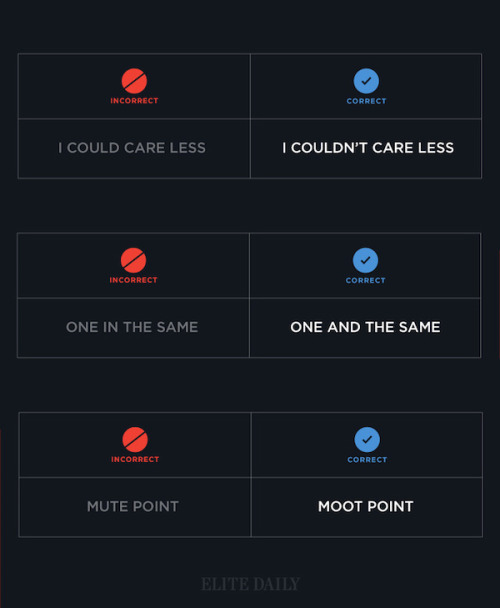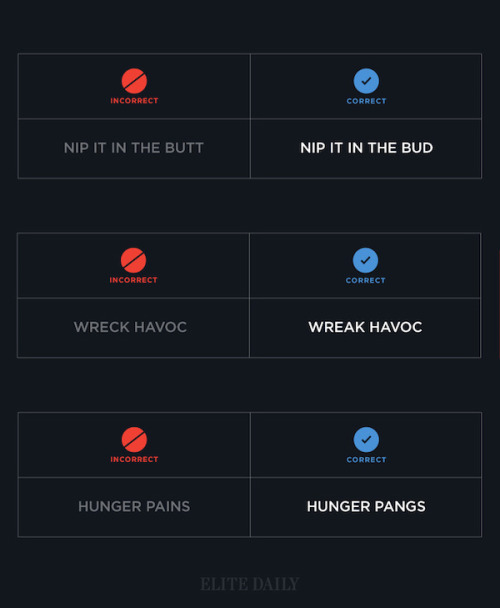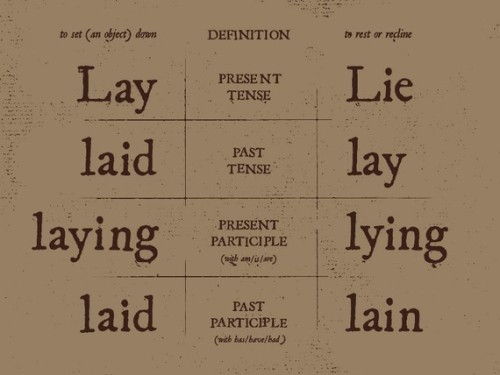Your personal Tumblr library awaits
Writing Tips - Blog Posts



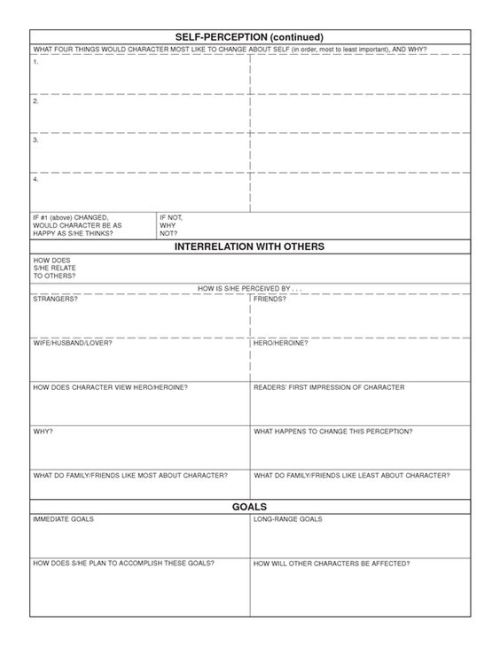
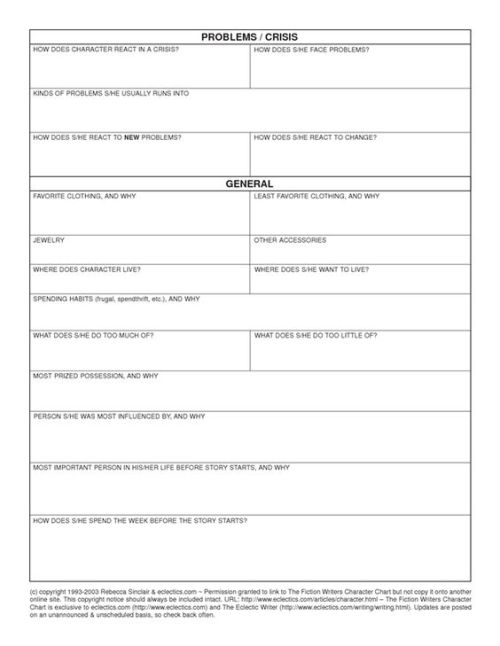
© (c ) copyright 1990-2011 Rebecca Sinclair
See the original HERE
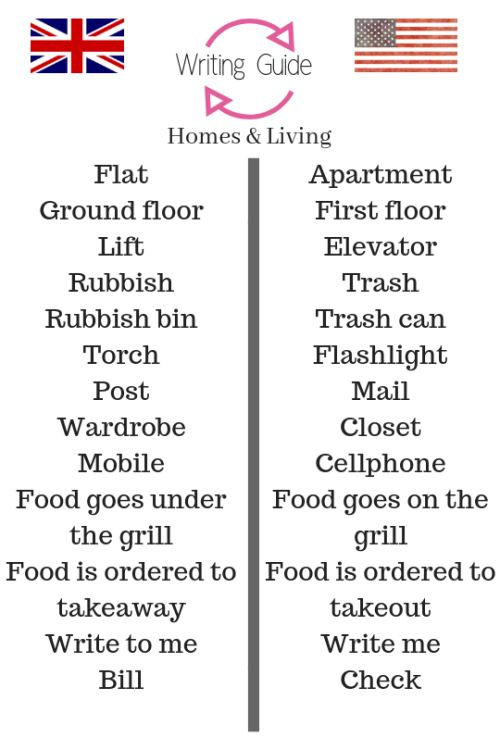


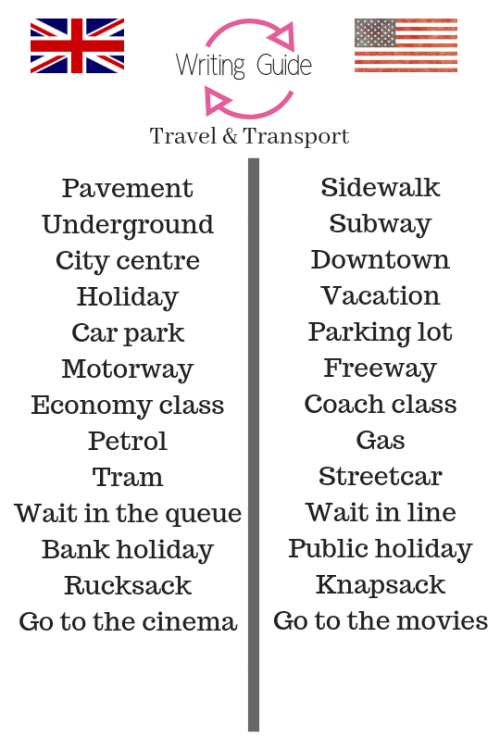
For any of you who are writing ‘across the pond’-here is a little guide I put together of some common differences between British and American English!
Hello Mr gaiman. How old were you when you started writing stories ? I'm 14 and I try and try but they are all awful. I always give up in the middle and I can never finish what I wanted to write.
I know. I found a pile of papers of mine from my teen years and into my early twenties recently, and there were so many stories begun, so many first pages of novels never written. I’d start them, and then I’d give up because they weren’t as brilliant as Ursula K Le Guin, or Roger Zelazny, or Samuel R Delany, and anyway I wasn’t actually sure what happened next.
I was around 22 when I started finishing things. They weren’t actually very good, and they all sounded like other people, but the finishing was the important bit. I kept going. A dozen stories and a book, and then I sold one (it wasn’t very good, and I had to cut it from 8,000 words to 4,000 to sell it, but I sold it). I probably wrote another half-dozen stories over the next year, and sold three. But now they were starting to sound like me.
Think of it this way: if you wanted to become a juggler, or a painter, you wouldn’t start jugggling, drop something and give up because you couldn’t juggle broken bottles like Penn Jillette, or start a few paintings then give up because the thing in your head was better than what your hands were getting onto the paper. You carry on. You learn. You drop things. You learn about form and shape and shade and colour and how to draw hands without the fingers looking like noodles. You finish things, learn from what you got right and what you got wrong, and then you do the next thing.
And one day you realise you got good. It takes as long as it takes. So keep writing. And all you need to do right now is try to finish things.
Words to use instead of “Very”!
👎🏼 Very simple 👍🏼 Basic 👎🏼 Very shy 👍🏼 Timid 👎🏼 Very short 👍🏼 Brief 👎🏼 Very shiny 👍🏼 Gleaming 👎🏼 Very sharp 👍🏼 Keen 👎🏼 Very serious 👍🏼 Grave 👎🏼 Very scary 👍🏼 Chilling 👎🏼 Very scared 👍🏼 Petrified 👎🏼 Very sad 👍🏼 Sorrowful 👎🏼 Very rich 👍🏼 Wealthy 👎🏼 Very rainy 👍🏼 Pouring 👎🏼 Very quiet 👍🏼 Hushed 👎🏼 Very quick 👍🏼 Rapid 👎🏼 Very pretty 👍🏼 Beautiful 👎🏼 Very powerful 👍🏼 Compelling 👎🏼 Very poor 👍🏼 Destitute 👎🏼 Very perfect 👍🏼 Flawless 👎🏼 Very pale 👍🏼 Ashen 👎🏼 Very painful 👍🏼 Excruciating 👎🏼 Very open 👍🏼 Transparent 👎🏼 Very old-fashioned 👍🏼 Archaic 👎🏼 Very old 👍🏼 Ancient 👎🏼 Very often 👍🏼 Frequently 👎🏼 Very noisy 👍🏼Deafening
I agree with the above. My writing professors always said 'there are rules, break them as long as you understand how and why'. The rules are important, but you're allowed to play with them. Bend them. Writing is an art form, we push the boundaries and limits set to us and that's what makes it interesting to read. Makes each author sound unique. Just be sure it's all moving the plot in some way or revealing character. It has to have a purpose.
Otherwise, write what you want to write. J. K. Rowling was denied again and again till someone saw the magic - pun fully intended - in her work. Stephen King was told his stories were too depressing, that no one would want to buy science fiction with negative utopias. That his novels would never sell. In the end they got picked up by agencies. Keep your heads up, there is hope.

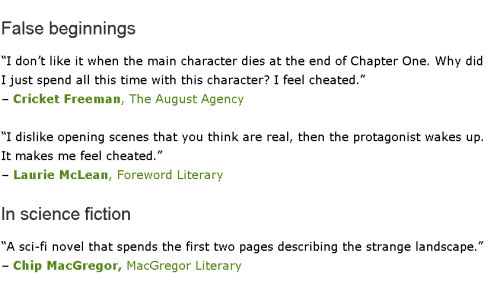
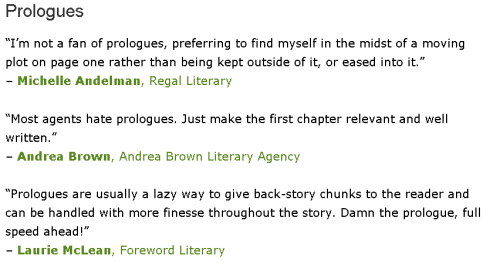

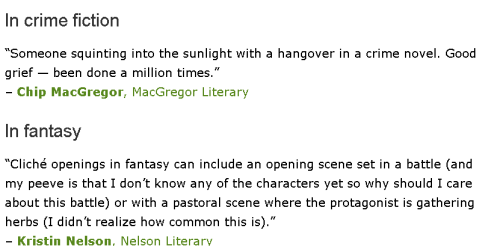
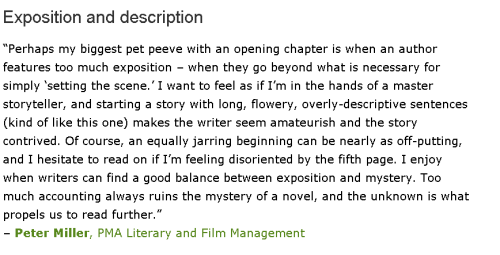
I couldn't agree more.
PSA
// You’re allowed to change your OC’s.
Seriously, they’re YOUR OC’s. It doesn’t matter if you made them 3 weeks ago or 3 YEARS ago. You’re allowed to change them however you like. If you feel a certain headcanon suits them better, even if it’s been 5 years down the track from when you started writing them, then change them!
Your OC’s belong to you and no one else. You’re allowed to change them as many times as you like–both physically and mentally.
Characters grow over time, just like people. Certain parts of their story might not come to light until months after writing them. And just when you think you know who your OC is, something else springs up and might explain why they are a certain way. Embrace that change and growth. Understand and accept who your OCs are, even if they are a villain muse. Let yourself know that they’re allowed to grow as we, the writers, do. They will shape and form with us.
You’re allowed to change your OC’s, and no one has the right to tell you that you can’t. <3
Advice for Fanfiction Writers
Note, these are my personal opinions but I thought they might help some people.
1) Always write for you. Not for likes or reviews/comments or favorites, write because it’s what you want to do.
2) Take a few minutes to proof read, don’t post right away. Get in the habit of editing.
3) Always leave a coherent summary. Don’t apologize or or talk to the reader in this section, let them know what the story is about. That’s what that space is there for. You don’t need to tell them it’s your first fanfiction, in fact it might color the reader’s impression of your story. Instead give readers a strong summary to keep them hooked. This leads to my next point.
4) Always stay confident. Criticism hurts, but that doesn’t mean you’re bad at writing or untalented. Keep at it, you’ve got this. Confidence shines through your work.
5) Do a little research, readers will appreciate it. I’m not sure I’ll trust a story where characters wears jeans in a medieval setting or use katana in modern London. A little bit of fact checking goes a long way.
6) Don’t hate on pairings you don’t like. This is more of a courtesy than anything, but fanfiction is about imagination and creativity. Hostility only leaves a bad impression of you on potential readers. Keep it to yourself if you can’t be nice.
7) Leave trigger warnings, please. Some readers really need them and views are not worth the emotional suffering of someone else. If you’re uncertain what might be a trigger then go ahead and note it anyway. Better safe than sorry.
8) Be yourself. Write what you want without fear. You can grow writing fanfiction, it isn’t something to be ashamed of. Many famous people did before fanfiction even had a name. Keep going and post your stories. You owe it to yourself.
Remember, you will always be growing as a writer. There is no peak, only improvement. It's a continual learning curve and you can only go up from here. So keep writing lovelies.
No tears in the writer, no tears in the reader. No surprise in the writer, no surprise in the reader.
Robert Frost
You own everything that happened to you. Tell your stories. If people wanted you to write warmly about them, they should have behaved better.
Anne Lamott
Eight rules for writing fiction: 1) Use the time of a total stranger in such a way that he or she will not feel the time was wasted. 2) Give the reader at least one character he or she can root for. 3) Every character should want something, even if it is only a glass of water. 4) Every sentence must do one of two things — reveal character or advance the action. 5) Start as close to the end as possible. 6) Be a sadist. Now matter how sweet and innocent your leading characters, make awful things happen to them — in order that the reader may see what they are made of. 7) Write to please just one person. If you open a window and make love to the world, so to speak, your story will get pneumonia. 8) Give your readers as much information as possible as soon as possible. To heck with suspense. Readers should have such complete understanding of what is going on, where and why, that they could finish the story themselves, should cockroaches eat the last few pages.
– Kurt Vonnegut

WRITING HELP/CHARACTER
writing a bitchy character (1,2,3,4,5,6,7,8,9,10)
writing a cocky character (1,2,3,4)
writing a emotion character (1,2)
How to play a hippie
Playing the quiet character.
Portraying the shopaholic.
Portraying a mute character.
Portraying a kleptomaniac.
How to play the stalker.
Writing distant, indifferent characters.
How to write a character who stutters.
Writing a character who is sassy.
A guide to playing a southern character.
Portraying characters with crushes.
How to portray a teen mom.
How to play a character who is mean.
How to portray a character high on cocaine.
Writing a character who is high on amphetamines.
Playing an efficient male character.
Portraying the asshole.
Playing a character who suffers from shyness.
How to play a mentally ill/insane character.
Writing a character who self-harms.
Writing a happy character.
Writing a character who suffers from night terrors.
Writing a character with paranoid personality disorder.
How to play a victim of rape.
How to RP a blind character.
Writing a leader.
Writing a character with Dissociative Identity Disorder.
Writing a character with depression.
Writing a character who is homosexual.
Writing a character with schizophrenia.
Playing a fe/male character.
Writing a character with Nymphomania.
How to write a worry wart.
How to write a character with HPD.
How to write a bad ass character.
Playing a pansexual.
Tips on writing a drug addict.
Tips on writing the pregnant female.
Writing insane characters.
Playing a character under the influence of marijuana.
Portraying a character with diabetes.
How to play a prankster.
Playing a character who has been adopted.
Portraying a vampire.
Playing a character with an eating disorder.
Portraying a character who is anti-social.
Portraying a character who is depressed.
How to portray someone with dyslexia.
How to portray a character with bipolar disorder.
Portraying a character with severe depression.
How to play a serial killer.
Writing a tomboy.
Playing a pyromaniac.
How to write a mute character.
How to write a character with an OCD.
How to play a stoner.
How to write an asexual character.
How to play a bitchy/vicious character.
How to play a character with HPD.
Playing a pregnant woman.
Playing the burn-out.
Writing a “nice” character.
How to play a gentleman.
How to play a shy/introvert character.
How to play a naive character.
Playing characters with memory loss.
How to write a character who smokes.
How to write pirates.
How to write characters with PTSD.
How to play a character who isn’t ready for sex.
How to play the geek.
Playing the manipulative character.
Portraying a character with borderline personality disorder.
Playing a character with Orthorexia Nervosa.
Writing a character who lost someone important.
Playing the bullies.
Portraying the drug dealer.
Playing a rebellious character.
How to portray a sociopath.
How to play a swimmer.
Portraying a ballerina.
Playing a promiscuous male.
Playing a character with cancer.
How to portray a bubbly character.
How to portray a power driven character.
How to portray the shy character.
Playing a character under the influence of drugs.
Playing a character who struggles with Bulimia.
Portraying a hippie.
Portraying sexually/emotionally abused characters.
Playing a character with asthma.
Portraying characters who have secrets.
Portraying a recovering alcoholic.
Portraying a sex addict.
How to play someone creepy.
Portraying a foreigner.
Portraying an emotionally detatched character.
How to play a character with social anxiety.
Portraying a character who is high.
How to play a strong, female character.
Writing a character with a hangover.
Playing angry characters.
Playing a character who is smarter than you.
Playing and writing autistic characters.
Portraying a trans character.
How to portray a dominant character.
Playing a character who is faking a disorder.
Playing a prisoner.
Playing the opposite sex.
Portraying a character who has PTSD.
Playing a character who stutters.
Portraying characters with Aspergers Syndrome.
How to play a depressed character who selfharms.
Portraying the “dumb” character.
How to portray a lesbian.
How to play a blind character.
How to play a sexual assault victim.
Writing a compulsive gambler.
Writing a closeted character.
Playing a werewolf.
Writing a character with an addiction to sex.
Writing a character who is drunk.
Portraying a character who is British.
Playing a Brit.
Portraying a character with amnesia.
Playing heroes.
Portraying a witty character.
How to play an INTJ.
How to play a vampire.
How to play a character who is manipulative.
Portraying the natural born leader.
Portraying the character who is flirtatious.
Writing a nice character.
How to portray a character who has asthma.
Playing a character with ADHD.
Writing characters with anxiety.
Amnesia
Children
A Death Scene
Loosing Someone (2)
Old Persons
Physical Injuries (2, 3)
Sexual Abuse (2)
Fight Scenes (2, 3, 4)
Horror
Torture
How to Describe the Body Shape of Female Characters
Character Apperance Help
Words to Describe Voice
Body Language Cheat Sheet
Character Development Exercises
101 Character Development Questions
Art of Character Development
Introducing Characters
Characters You Need to Reinvent
Making Characters Likeable
Heros and Villains
Describing Clothing
Understanding Body Language
100 Positive Traits
Mental Illness in Writing
Conflicts and Characters
JOBS/HOBBIES
Actors
Ballet Dancer (2)
Christianity
Foreigners
Gamblers
Hinduism
Hitmen
Satanism
Smokers
Stoners
Taoism
Journalists
Vegetarians
LOCATIONS
Australia
Boston
California (2, 3)
England/Britain (2, 3, 4, 5)
New York
Prison
London
The South (2)
GENDERS
Females (2)
Males (2)
Transgender People
NAMES
Female Names (2, 3, 4, 5)
Male Names (2, 3, 4, 5)
Last Names (2, 3, 4)
QUOTES
Song Lyrics Masterlist
Songs for Biographies
Favorite Quotes: TV and Movies
Favorite Quotes: Notable Authors
Favorite Quotes: Celebrities
Favorite Quotes: Popular Books (2)
Quotes From Songs
Character Quotes
Masterlist of Bio Lyrics
Masterlist of Bio Quotes
Masterlist of Song Lyrics
Biography Lyrics
A Masterlist of Quotes
+130 Quotes
SMUT
Smut Guide: Casual Sex
Smut Guide: For Beginners
How to: Write a First Time Sex Scene Romantically
How to: Smut - The Bare Bones
How to: Smut (For Virgins)
How to: Write Lesbian Smut
How to: Write Smut (2, 3)
How to: Write a Blowjob/Prepping for Smut
Smut Guides of Tumblr
Tips on Writing Sex Scenes
A Guide to Language in Smut
Domination and Submission
Making Love
A Smut Guide
KISSES
How to: Write a Kiss (2)
Different Types of Kisses
Writing Out the First Kiss
GRAMMAR
Placement of Speech Tags
Grammar and Spelling
Grammar Slammer!
American vs. British Grammar
HyperGrammar
Grammar Girl
Punctuating Dialogue
How to Use the Semicolon
Introduction to the Basic Rules of Punctuation
Comma 101
All About Dialouge
11 Grammar Tips
Comma Usage
Correct Use of Apostrophe
Proofreading
Transition Words
40+ Tips to Improve your Grammar and Punctuation
Better Writing: Grammar & Spelling
Semicolons and Colons
Underlining and Italicizing
Dashes and Parentheses
Hyphens
Apostrophes
The Ellipsis
List of 1000+ Adjectives
ART
painting tutorial
colour palette (1) (2) (3) (4) (5) (6)
drawing clothe folding
avoiding drawing the same face
draw ice
anatomy help
free drawing program (1) (2)
sai brushes (1) (2) (3) (4) (5) (6) (7) (8)
draw hair
drawing ref
dont know what to draw?
draw 3D room tut
drawing eyes
lip tutorial
how to draw jeans
how to draw arms
expression tutorial
drawing hair and fur
drawing cats
pose reference blog [its actually a blog full of references i-]
download photoshop
paint blood
color blender
draw hands
hands 2
photoshop help (1) (2) (3) (4) (5)
remove backgrounds from images online
clouds
brush setting ref (SAI)
kissing ref
how to draw curls
realistic woman body ref
draw knees
draw feet
shadow help
male body
lips ref
contouring and highlighting
draw wings
change images using blur (PS)
gray
hat ref
glowing stuff
pastel colors
draw grass
eyeliner ref
Painting tutorial
Female/male arms
Kneeling + Sitting ref
Dragon head view tutorial
SAI brushes 86786
Drawing expressions
Sai Brushes 1
NGE colour palette 1
100+ colour palletes
Avoiding same face
Face contours/highlighting
free art MyPaint
Body anatomy help 1
How to shift images using blur in PS
Drawing clothe folding
How to draw ice
Colour palette 1
Colour palette 2
SAI brush settings 2
SAI/PS pixel brushes
Warm/Cool gray
Flower crown tutorial
Skin colour palette
Pink colour sheet
How to draw butts&thighs
The male torso
Drawing glowing stuff in SAI
Drawing horse/animal legs on humans
Drawing clouds
Muscular male with bow stock photos
Pastel colours
Drawing grass fields in SAI
Expressions&Legs
All about the human body
20+ colour palettes
Colour conversion
Kissing ref
Creature design
Colour meanings
Creating expression
Tutorial masterpost (100+)
Lineart
Canine
How to colour
Pose studies
Feline comparisons
How to draw penis
Leaf pressing
100+ anatomy references
How to draw folds
SAI brushes 3
Sitting poses
Colour palette 4
Cloud painting
How to draw 3D rooms
Colour info
Colouring ref
Hair tutorial
Clothing ref
Bodies and poses
SAI brushes 5
Colour scheme designer
Folding ref
Heads&Angles
Paint tool SAI masterpost
Drawing ref masterpost (10+)
Hair+Fur
How to draw faces
SAI brushes 4
Anatomy of mutant humans
What should I draw?
Free art software
pastel colour ref
Mass art ref
Soft SAI brushes
ways to draw stuff
SAI brush settings
baseball cap ref
Penis ref
Drawing human wings
Cool free art software
Huge art ref
Colour blender
2 SAI brushes
Photoshop for free
MAKEUP
eyeliner
how to apply blush
how to draw eyebrows
ombre eyeliner
lipstick trick
the kitty eye ^.^
nude lips
smokey eye make up
what you need to know about beauty
5 of the best foundations
best powder foundations
quick foundation tip
how to apply liquid foundation
breaking it down
makeup highlights tutorial
blush for your skin tone
how to apply bronzer
how to contour your face
apply blush like a pro
blush according to your face shape
d.i.y. gel liner
get the perfect winged liner
get winged liner using tape
awesome eyeliner tricks
9 different eyeliner looks
different eyeliner styles
guide to applying eyeshadow
suit your eyeshadow to your eyes
glittery smoky eye
get the perfect smoky eye
a shade for every occasion
kool-aid lip stain
best lipsticks for blondes
hot red lips
how to get gradient lips
lipstick shades for fall
how to make any lipstick look matte
get soft kissable lips
long lasting makeup tricks
victoria’s secret model tips
saving face
beginner’s guide
when will it expire?
10 makeup tips from mac
best tips from professionals
18 beauty essentials
basics you should own
make-up brush tutorial
brush tricks
clean your makeup brushes
make-up brush guide
make up hacks
easy make up tips
BODY CARE
the runaway to gorgeous skin
winter dryness
acne foundation routine
wash your face correctly
how to wash your face 101
HAIR
messy bun tutorial
different ways to braid
three-braid updo
waterfall braid
how to fishtail
romantic curls
braid + bun updo
how to do pastel hair
8 ways to wear a bow
4-strand braid
braided bun
braided headband
dutch braid crown
pin curls!
how to contour
everyday makeup routine
lipstick using crayons
eyeliner ref wow
filling in eyebrows
banana facial mask (moisturizes)
strawberry facial mask (acne prone skin)
avocado facial mask (dry skin)
yogurt facial mask (sensitive skin)
list of oils to add to your face masks
already made masterpost :*
OTHER
sleep calculator
survive nature
rain
tumblr music
calming rain
need a hug?
like the sound of a coffee shop?
can’t remember the name of a song?
the thoughts room
how to love yourself
upload anything from your iPhone etc. to your laptop
learn another language
make HUGE unpoppable bubbles
play some piano
draw a stick man and watch the story!
thousands of stars (you can zoom in/out and learn about them)
check if a username is taken (any site! twitter/tumblr, etc)
draws stuff as you move your curser
tell your thoughts to no one
play with cob web
make music with balloons
learn to play the guitar
learn to build a ship in a bottle
learn origami
learn some yoyo tricks
make your own stuffed animals
how to decorate iphone cases
make a candle
important things you should remember
how to kill your anxiety
how to help someone with their anxiety
look for literally any book you want (free)
waterproof your shoes
know what your emotion is
how to love yourself
ultimate writers resources masterpost
learn how to make punk edits without photoshop
dont know what to read?
learn a new habit
how to answer the top 35 asked questions when applying for a job
want to draw?
The quiet place
MOVIES
Giant Movie masterpost
Disney movies masterpost
Superhero movies masterpost
Movies for when you’re sick
Scary movies masterpost
Tumblr dedicated to finding movie links
When to pee during a movie
What's the difference between 'enemies to friends to lovers' and 'rivalmance'?
First off, different writers will have different interpretations of certain tags/genres within fan fiction. This is my take on them:
Enemies to Friends to Lovers shows the progression of two people who start out hating each other, slowly grow closer and then fall in love. It’s a really common trope that you see in a lot of literature and film. One example: an assassin is sent to kill the protagonist, but the two of them get stuck having to work together towards a common goal, even though they don’t trust one another. Over time (usually through a couple “you saved my life when you could have run” encounters) the two of them become friends. They genuinely care for each other’s well-being and they have each other’s backs. Slowly, their feelings become romantic. The closer they become, the more their attraction grows. It may take them some time to admit to these feelings (usually held back by the fact that their circumstances should be pitting them against one another), but eventually they become lovers.
Rivalmance is a bit harder to pin down. A rivalmance could be something as tame as two people who are antagonistic and yet still love each other or something as extreme as two people who hate each other and yet have a sexual relationship. The fan fiction I’ve seen in this category more often than not sways toward the latter.
Rivalmance doesn’t usually have the same progression into kindness as Enemies to Friends to Lovers has. More often than not, the members of a rivalmance still genuinely dislike (and possibly hate) each other. Many times intimacy in a rivalmance is based upon mutual lust rather than love or tenderness. Hate sex is far more likely to show up here.
If we took the same story as above, the assassin and the protagonist still hate and distrust each other, yet there is an undeniable sexual tension between them. They are forced to work together, yet they do not build mutual trust. They may grow to care for each other’s well-being (as in, they wouldn’t want to see the other killed), but it’s more motivated by their circumstances than any real love or empathy. Their intimacy couldn’t really be mistaken for “making love”. Oftentimes there is a power struggle between the two of them throughout all of their interactions and sex is often no different. They are not particularly kind to one another, nor are they very giving unless they expect to receive something in return.
The Motivation Guide
One of the biggest problems writers face is the lack of motivation to continue or finish their projects. For me personally, it’s the number one reason why I give up writing something. Losing interest is a problem that can be fixed, however.
I came up with this guide to refer to when you’re wondering how to motivate yourself. Remember, there are reasons why you might want to skip out on a project, but you should try getting yourself excited about your work first. Here are a few things to do when you’re lacking motivation:
Make plans for the future – try to figure out what the next step in your story is going to be.
Overanalyze your characters – it’s better to know too much about your character than not enough.
Think on your feet – don’t be afraid to go in an unexpected direction.
Invent new ideas – if you’re stuck, look at something from a new angle
Visualize your characters – try casting your novel in your head
Anticipate what will come next – when you’re done for the day, figure out what you’ll tackle next
Try something new – introduce a new character or explore a different subplot
Invite other writers in – get together with writer friends and brainstorm, in person or online
Organize your outline – don’t forget to revisit your outline from time to time and reorganize
Never forget your goals – write them down and put them somewhere you can see every day
-Kris Noel
a massively extended version of ruthlesscalculus’ post
General Tips
Joss Whedon’s Top 10 Writing Tips
Getting Out of Your Comfort Zone
34 Writing Tips that will make you a Better Writer
50 Free resources that will improve your writing skills
5 ways to get out of the comfort zone and become a stronger writer
10 ways to avoid Writing Insecurity
The Writer’s Guide to Overcoming Insecurity
The Difference Between Good Writers and Bad Writers
You’re Not Hemingway - Developing Your Own Style
7 Ways to use Brain Science to Hook Readers and Reel them In
8 Short Story Tips from Kurt Vonnegut
How to Show, Not Tell
5 Essential Story Ingredients
How to Write Fiction that grabs your readers from page one
Why research is important in writing
Make Your Reader Root for Your Main Character
Writing Ergonomics (Staying Comfortable Whilst Writing)
The Importance of Body Language
Character Development
10 days of Character Building
Name Generators
Name Playground
Universal Mary Sue Litmus Test
Seven Common Character Types
Handling a Cast of Thousands Part 1 - Getting To Know Your Characters
Web Resources for Developing Characters
Building Fictional Characters
Fiction Writer’s Character Chart
Character Building Workshop
Tips for Characterization
Character Chart for Fiction Writers
Villains are people too but…
How to Write a Character Bible
Character Development Exercises
All Your Characters Talk the Same - And They’re Not A Hivemind!
Medieval Names Archive
Sympathy Without Saintliness
Family Echo (Family Tree Maker)
Behind The Name
100 Character Development Questions for Writers
Aether’s Character Development Worksheet
The 12 Common Archetypes
Six Types of Courageous Characters
Kazza’s List of Character Secrets - Part 1, Part 2
Creating Believable Characters With Personality
Body Language Cheat Sheet
Creating Fictional Characters Series
Three Ways to Avoid Lazy Character Description
7 Rules for Picking Names for Fictional Characters
Character Development Questionnaire
How to Create Fictional Characters
Character Name Resources
Character Development Template
Character Development Through Hobbies
Character Flaws List
10 Questions for Creating Believable Characters
Ari’s Archetype Series
How to Craft Compelling Characters
List of 200 Character Traits
Writing Characters of the Opposite Sex
Making Your Characters Likable
Do you really know your characters?
Character Development: Virtues
Character Development: Vices
Character Morality Alignment
List of Negative Personality Traits
List of Positive Personality Traits
List of Emotions - Positive
List of Emotions - Negative
Loon’s Character Development Series - Part 1, Part 2, Part 3, Part 4
Phobia List A-L (Part 1), M-Z (Part 2)
30 Day In Depth Character Development Meme
Words for Emotions based on Severity
Eight Bad Characters
High Level Description of the Sixteen Personality Types
Female Characters
How Not to Write Female Characters
Writing Female Characters
How to write empowering female characters
Why I write strong female characters
Red Flags for Female Characters Written by Men
Writing strong female characters
The Female Character Flowchart
Eight Heroine Archetypes
Male Characters
Eight Hero Archetypes
Tips for Specific Characters
Writing A Vampire
Writing Pansexual Characters
Writing Characters on the Police Force
Writing Drunk Characters
Writing A Manipulative Character
Writing A Friends With Benefits Relationship
Writing A Natural Born Leader
Writing A Flirtatious Character
Writing A Nice Character
Fiction Writing Exercises for Creating Villains
Five Traits to Contribute to an Epic Villain
Writing Villains that Rock
Writing British Characters
How To Write A Character With A Baby
On Assassin Characters
Dialogue
It’s Not What They Say…
Top 8 Tips for Writing Dialogue
Speaking of Dialogue
The Great Said Debate
He Said, She Said, Who Said What?
How to Write Dialogue Unique to Your Characters
Writing Dialogue: Go for Realistic, Not Real-Life
Point of View
Establishing The Right Point of View
How to Start Writing in the Third Person
The I Problem
Plot, Conflict, Structure and Outline
Writing A Novel Using the Snowflake Method
Effectively Outlining Your Novel
Conflict and Character Within Story Structure
Outlining Your Plot
Ideas, Plots and Using the Premise Sheets
How To Write A Novel
Creating Conflict and Sustaining Suspense
Plunge Right In…Into Your Story, That Is
Tips for Creating a Compelling Plot
36 (plus one) Dramatic Situations
The Evil Overlord Devises A Plot: Excerpt from Stupid Plot Tricks
Conflict Test
What is Conflict?
Monomyth
The Hero’s Journey: Summary of Steps
Outline Your Novel in Thirty Minutes
Plotting Without Fears
Novel Outlining 101
Writing The Perfect Scene
One-Page Plotting
The Great Swampy Middle
How Can You Know What Belongs In Your Book?
Create A Plot Outline in 8 Easy Steps
How to Organize and Develop Ideas for Your Novel
Create Structure in your novel using index cards
Choosing the best outline method for you
Hatch’s Plot Bank
Setting & Worldbuilding
Magical Word Builder’s Guide
I Love The End Of The World
World Building 101
The Art of Description: Eight Tips to Help Bring Your Settings to Life
Creating the Perfect Setting - Part 1
Creating a Believable World
Setting
Character and Setting Interactions
Maps Workshop - Developing the Fictional World Through Mapping
World Builders Project
How To Create Fantasy Worlds
Creating Fantasy and Science Fiction Worlds
Creativity Boosters* denotes prompts
*Creative Writing Prompts
*Ink Provoking
*Story Starter
*Story Spinner
*Story Kitchen
*Language is a Virus
*The Dabbling Mum
Quick Story Idea Generator
Solve Your Problems By Simply Saying Them Out Loud
Busting Your Writing Rut
Creative Acceleration: 11 Tips To Engineer A Productive Flow
Writing Inspiration, Or Sex on a Bicycle
The Seven Major Beginner Mistakes
Complete Your First Book with these 9 Simple Writing Habits
Free Association, Active Imagination, Twilight Imaging
Random Book Title Generator
Finishing Your Novel
Story Starters & Idea Generators
Words to Use More Often
Revision & Grammar
How To Rewrite
Editing Recipe
Cliche Finder
Revising Your Novel: Read What You’ve Written
Writing 101: Revising A Novel
20 Common Grammar Mistakes That (Almost) Everyone Makes
Synonyms for the Most Commonly Used Words of the English Language
Grammar Urban Legends
Tools & Software
Tip Of My Tongue - Find the word you’re looking for
Write or Die - Stay motivated
Stay Focused - Tool for Chrome, lock yourself out of distracting websites
My Writing Nook - Online Text Editor, Free
Bubbl.us - Online Mind Map Application, Free
Family Echo - Online Family Tree Maker, Free
Freemind - Mind Map Application; Free; Windows, Mac, Linux, Portable
Xmind - Mind Map Application; Free; Windows, Mac, Linux, Portable
Liquid Story Binder - Novel Organization and Writing Application; free trial, $45.95; Windows, Portable
Scrivener - Novel Organization and Writing Application; free trial, $39.95; Mac
SuperNotecard - Novel Organization and Writing Application; free trial, $29; Windows, Mac, Linux, portable
yWriter - Novel Organization and Writing Application; free; Windows, Linux, portable
JDarkRoom - Minimalist Text Editing Application; free; Windows, Mac, Linux, portable
AutoRealm - Map Creation Application; free; Windows, Linux with Wine
Specific Help
Fashion Terminology
All About Kissing
Genre Help: Romance
187 Mental Illnesses
Types of Mental Illness
Eye Color List
Spectral Groupings
A good thing to remember when writing: the first letter of the first word of a sentence is always capitalized. Always. Secondly, “said” is almost never capitalized. This:
“Hey.” Said the guy.
should nEVER EVER HAPPEN. “Said” pretty much never ever starts a sentence and certainly never with quotes or dialogue.
USING SAID: “Hey,” said the guy.
Any time you would put a period at the end of the quote, but it is followed by a dialogue tag, replace the period with a comma.
If the quote ends with a question mark or exclamation mark, the capitalization remains the same: “Hey!” said the guy.
ONLY, ONLY EVER, USE A PERIOD IF THE DIALOGUE TAG (THAT’S WHAT SAID AND ALL THOSE OTHER WORDS ARE) COMES BEFORE THE QUOTE: The guy said, “Hey.”
THIS HAS BEEN A PSA
THERE MUST BE A PARAGRAPH BREAK EVERY TIME A NEW CHARACTER SPEAKS
THIS IS NOT OPTIONAL
NO ONE WANTS TO READ ONE BIG BLOCK OF TEXT JESUS CHRIST
writers
write that sentence, that dialogue, that scene that terrifies you
don’t delete stuff, just move it to another document
have a “bits and pieces” document for all the odds and ends you can’t fit anywhere else
think of the color of a person’s eyes, imagine something reflected in them, now write that scene
fiction doesn’t have to be 100% accurate, don’t research yourself to boredom
i’m being serious there’s a thing called suspension of disbelief and it’s magical (yes that’s me making a joke)
write something that makes you cry
write something that makes you laugh
write something you can’t explain to other people
write something you won’t remember until you read it the next day
don’t read about the publishing industry until you really, really need to. all it will do is make you unbelievably tired
listen to music from open world RPG video games, you’re welcome
always take a small journal or some paper and a pen with you
write by hand in a journal every once in a while
put the ending of your story in the beginning and see what happens
listen to input from other people. yes you’re the writer, but they’re the reader and they want to help you make something spectacular
said is not dead dude like wtf
the thesaurus is shiny and lovely and a great resource but don’t let words get in the way of your story telling, you don’t need to write prose as poetry for it to be beautiful
just finish the draft first, worry about perfection after
yes, you do have talent
yes, you can do this. you already are
Writing Tips #10
Spend time world building. Even if you're writing fanfiction, you need to know the world in which your characters reside. I’ve beaten this to death, but that will require research of the source material or history books.
Is it a monarchy or is there a president? Who delivers justice? What are the rights of the people? How is education?
Keep notes and make sure nothing conflicts. It’s just as important to have a seamless world as a flawless plot. You can’t have a world full of contradictions (unless you’re writing Alice in Wonderland) and holes without hurting yourself in the long run.
Plot out your worlds like you would your characters.
WHAT TO DO AFTER FINISHING A FIRST DRAFT.
Revise a different draft.
Write a new piece.
Read a craft article. (LitReactor.com is pretty good!)
Read a short story or book.
WHAT YOU SHOULDN’T DO AFTER FINISHING A FIRST DRAFT.
Revise it.
WHY NOT?
You have to be as detached from a draft as you possibly can when you polish it. You have to be able to trim the fat from your baby and take out all those words, sentences and fragments that are stopping it from being a great story. I’m sure those words you used are beautiful and they sound amazing, but if they’re stalling the plot they have to go.
HOW DO I KNOW WHAT TO KEEP AND WHAT TO THROW AWAY?
Read! The best way to know what a perfectly paced story is like is to read one. There’s no black-and-white, two-plus-two way to answer this, but this is what works for me:
Avoid adverbs, those words that tend to end in -ly.
Keep descriptions to a minimum. People are interested in your story. If they want to see what a place or person is like they go to Google images. If they come to you it’s because they want to be entertained.
Change passive voice sentences to subject-verb-complement sentences. You will get the same idea across in less words.
FINAL TIP
Try not to make changes on your first pass! If your word processor has a comment function use that to write the changes you need to make. If you read and edit at the same time you’ll be doing two things at once and you’ll get tired much quicker.
FINAL FINAL TIP
Enjoy yourself! You’re an artist. Write and revise for yourself. Love it.
i just found this website that can randomly generate a continent for you!! this is great for fantasy writers

plus, you can look at it in 3d!

theres a lot of viewing options and other things! theres an option on-site to take a screenshot, so you don’t have to have a program for that!
you can view it here!

Tastes and aromas. What a fun little chart!
"But my Plot isn’t UNIQUE or BIG enough!”
One thing that I worry about is that my plot isn’t good enough. I know lots of other writers who have had this issue in the past as well, and it’s all about having confidence in yourself and your ability to tell a tale.
The plot doesn’t have to be groundbreaking, just think of how many people get fed up of Shyamalan twist-endings. They’re clever sometimes, yes, but they’re also not what everyone ever is looking for, and when they are forced into a piece of work it is painfully obvious to anyone who really values what you’ve written.
What matters is the telling of the story. Your plot can be exceptionally simple, and you might write one of the most compelling books of our era.
I found one thing that helped was to look at other works, and try and break them down into their very, very simplistic terms - the bare bones, the things the author would have decided up front perhaps. The things that… if told without the wonder of the story, might have been boring.
Like A Song of Ice and Fire, for example, which tells the stories of Political struggle against a backdrop of Ice creatures who can raise the dead and force them to attack you. It’s basically a Socio-Political zombie apocalypse, with dragons. That could have gone either way; as it was, it went amazingly. Because Martin is a master of making every character a person, and building such a rich, colourful world that we believe it.
So, what I’ve done is looked at a very popular work that spans multiple books. Harry Potter is widely known, so this should be useful to as many people as possible. It is also praised as one of the most in depth and atmospheric works for children, young people, adults, or just about anyone, having been translated, adapted and studied over and over.
HARRY POTTER BREAKDOWN
Bread and Butter
So, when I asked Google what the heck the plot of Harry Potter was, I got this;

This is what I’m going to call the BREAD AND BUTTER of the story. It’s what happens in the day-to-day of the story. It’s perhaps the introduction J. K. would have given when first sending in her manuscript. It’s also a hugely unoriginal idea.
The concept of a young Witch or Wizard attending a magical school where they can learn their abilities has been done before, a lot. It is basically the prmise of books like EarthSea and the Worst Witch.
So next time you think your premise is overdone or uninspired, remember that it doesn’t matter. It’s not the premise that counts, it’s what you do with it. What Rowling did with it was create an in-depth world, full of structures and rules, populated by characters we all loved, hated, felt sorry for or routed for. She also made sure to include a way for us to learn more about the world, so she made her protagonist just as unaware of the wonder and horror as all of us.
Tea
In this case, tea is gonna’ be the conflict of the story. The main arc. Because going to a Wizard School is freaking awesome and everything, but this story needs risk. Our characters need to be in danger, and they need something to overcome. Often writers get stuck here. They have a wonderful setting and they really want to write about their character doing this or that, but what’s the main goal? What is there to overcome?
Very simply, Rowling’s villain is a man who wishes to purify the progression of magic by weeding out those who’s blood he see’s as tainted. He is a Hitler-figure, who himself should be ‘tainted’ in his own view. That’s the villain’s GOAL. It’s clear, and simple.
If you think your villains goal is too simple, just look at Voldemort’s goal. What makes it more complex are the many twists and turns he and Harry both have to adapt too. His many failures, as well.
Voldemort fits into many tropes, including the bad guy ‘selling his soul’ to achieve a vain goal, the bad guy murdering the heroes’ parents, the ‘more like you than you think’ trope, where a Villain and a hero are quite similar. I especailly like that last one, because J. K. played with it. Yes, she included it, and yes she gave a magical reason as to why.
That just shows that unique elements can be added on to overdone ideas, to make them wonderful.
Jam and Cream
This is where Rowling turns her simple ideas into something beautiful. Whether an idea is original or not, it will not matter if the depth is not there. Jam and Cream stands for all the little things.
The fact one of the most hated antagonists was only a prime player in one book but left such an impression, the fact Hermione was disliked by the main characters at first, the fact Neville was the cowardly laughing stock of the group for years. Let’s see… The fact Sybil was right about almost all of her predictions and no one believed her, thus linking her with the Mythological figure Cassandra.
The use of diversion and tension in The Prisoner of Azkaban, the fact that Harry’s own father was rather arrogant and mean at times, yet still a good person. The moral ambiguity of characters like Dumbledore or Snape.
And…
That isn’t even naming the things the books got wrong. Because every author makes mistakes. Yes! You’re allowed too! J. K. has Dumbledore play the ‘I’m going to withhold information from you for the sake of the plot,’ card. We are also supposed to believe Harry forgave everything Snape ever did and named his son after him because he rather fancied his mother. Many issues are left unaddressed, such as the disinterest/damn right rudeness towards Hagrid in the final years, or the silly quest over the fake Sword.
But in the end, if the story is told masterfully, no one is going to care.
Basically, what I’m trying to say is, if you plot is overdone, don’t worry about it. If your world feels familiar, do more to make it your own. If your villain feels like a trope, give them more twists and turns, and maybe a reason for the trope that fits your world alone. If your characters feel stale, give them more scenes that address their personality.
You’re doing fine, and your manuscript is totally fine. If you believe it in, there’s gonna’ be at least a hundred more people who would too.
writing specific characters - advice
a young character
a character who lost someone important
a villain (2)
a character based on yourself
a hit man or mercenary
an indifferent character
a bitchy character
a dancer
a vampire
a drunk character
a manipulative character
a friends with benefits relationship
a natural born leader
a nice character
a rich character
a witty character
Writing Tip #9
Have someone you look up to or respect read your work. It can be nice to have your parents and best friends read it, but face it, they’re prone to bias. You can still show it to them, but if you want feed back turn to someone else. A respected teacher, someone you admire on tumblr, or a friend you know will be brutally honest will all work. Just remember to ask nicely, they’ll be taking time out of their schedules to do this for you.
Give them a hard copy if you can or use Google Docs, it allows them to place comments so you won’t forget. Also, try not to be offended. You won’t be around to defend your work to other readers, so take it to heart. Don’t get snippy to that person, remember that you did ask them to do it.
Don’t get discouraged! There is always room to improve and so challenge yourself. Keep writing and don’t forget to thank your readers for helping you out. Maybe they’ll do it again.
